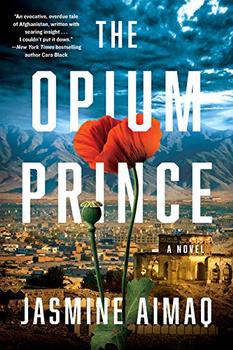Summary | Excerpt | Reviews | Beyond the book | Read-Alikes | Genres & Themes | Author Bio

An extraordinary, cinematic saga of rags-to-riches-to-revolution--called a "Doctor Zhivago of Iran" by Margaret Atwood--that follows an orphan girl coming of age at a time of dramatic upheaval.
It is the 1950s in a restless Iran, a country rich in oil but deeply divided by class and religion. The government is unpopular and corrupt and under foreign sway. One night, an illiterate army driver hears the pitiful cry of a baby abandoned in an alley and menaced by ravenous wild dogs. He snatches the child up and takes her home, naming her Aria--the first step on an unlikely path from deprivation to privilege. Over the next two decades, the orphan girl acquires three mother figures whose secrets she will only learn much later: reckless and self-absorbed Zahra, who abuses her; wealthy and compassionate Fereshteh, who adopts her; and mysterious Mehri, whose connection to Aria is both a blessing and a burden. A university education opens a new world to Aria, and she is soon caught up in the excitement and danger of the popular uprising against the Shah that sweeps through the streets of Tehran. The novel's heart-pounding, explosive finale sees the Ayatollah Khomeini's brutal regime seize power--even as Aria falls in love and becomes a mother herself.
Nazanine Hozar's stunning debut gives us an unusually intimate view of a momentous time, through the eyes of a young woman coming to terms with the mysteries of her own past and future.
Aria explores an array of experiences from a female perspective, including childbirth, love, marriage, loss, mothering, inheritance and abuse. The novel's third-person narrative allows for an ambitious blend of storylines and people, though some, such as Aria's childhood neighbor Kamran, seem to evaporate until they become useful again in the context of the growing political and social unrest. At times, the shift between storylines can be jarring, but the book is consistently engaging and fast-paced throughout. Aria is a complex chronicle of growth amidst burgeoning violence, uprising and a nation grappling with class differences...continued
Full Review
(687 words)
This review is available to non-members for a limited time. For full access,
become a member today.
(Reviewed by Daniela Schofield).
Nazanine Hozar's debut novel Aria opens in 1953 Iran and concludes nearly three decades later in 1981, two years after the Iranian Revolution and the establishment of the Islamic Republic. Her narrative weaves together threads from across mid-20th century Iran's complex and diverse social, economic and religious groups. Class stratification during this time is central to the events of the novel and serves as the backdrop against which they unfold.
The revolution was rooted in Islamist ideology and figureheaded by cleric Ayatollah Ruhollah Khomeini. Khomeini's revolutionary movement made three promises to the citizens of Iran: independence from the authoritarian state of Shah Mohammad Reza Pahlavi, freedom and democracy, and social ...
This "beyond the book" feature is available to non-members for a limited time. Join today for full access.

If you liked Aria, try these:

by Marjan Kamali
Published 2025
From the nationally bestselling author of the "powerful, heartbreaking" (Shelf Awareness) The Stationery Shop, a heartfelt, epic new novel of friendship, betrayal, and redemption set against three transformative decades in Tehran, Iran.

by Jasmine Aimaq
Published 2022
Jasmine Aimaq's stunning debut explores Afghanistan on the eve of a violent revolution and the far-reaching consequences of a young Kochi girl's tragic death.
I like a thin book because it will steady a table...
Click Here to find out who said this, as well as discovering other famous literary quotes!